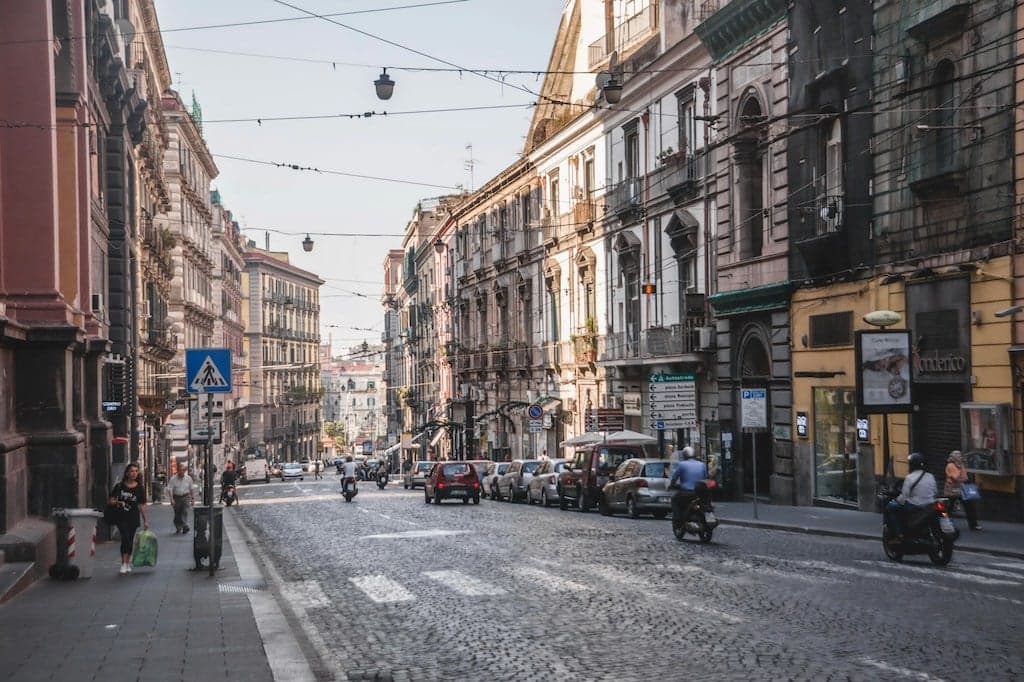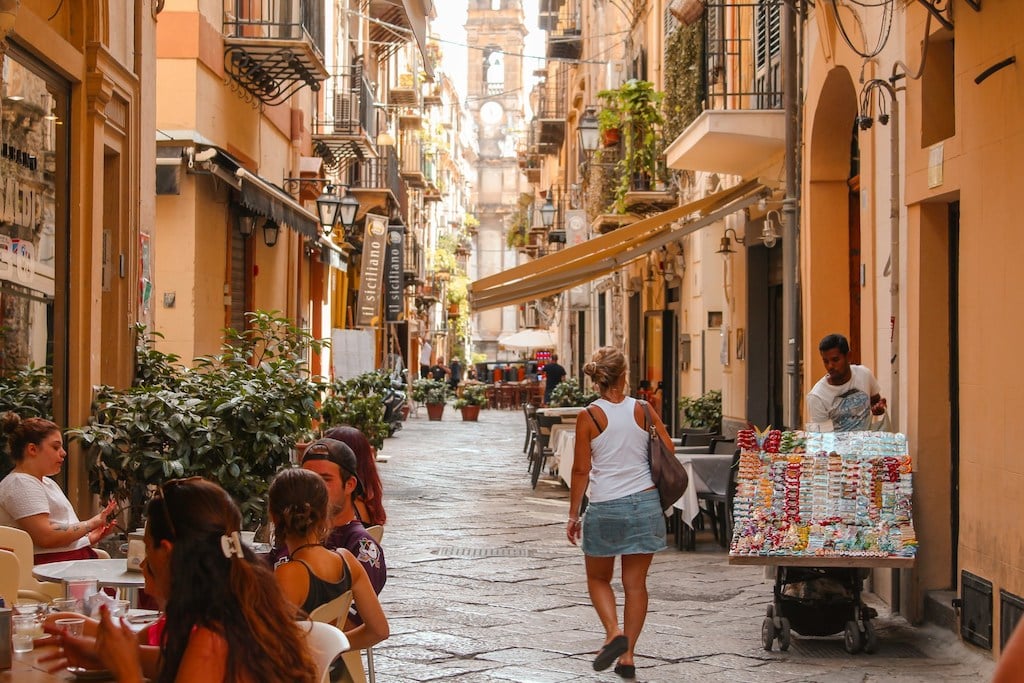Americans in Italy: Six hard facts about moving to Italy and the lowdown on Naples

What do you need to know about relocating to the US from Italy and what's it like to live in Naples as a US citizen? We explore in our latest Americans in Italy newsletter.
Welcome to our regular look at everything you need to know about life in Italy for The Local’s readers from the US. This newsletter is published monthly and you can receive it directly to your inbox before we publish by going to newsletter preferences in ‘My Account’ or following the instructions in the newsletter box below.
From the food to the culture to the climate, there’s a long list of positives that come with a move to Italy from the US - but if you're thinking of taking the plunge, there are certain practical considerations you'll need to bear in mind.
Work, taxes, visas, healthcare and driver's permits are some of the less glamorous aspects of life you'll have to engage with if you're serious about relocating.
Unfortunately, the US doesn't have a reciprocal driving license agreement with Italy, meaning that after 12 months of residency, you'll need to resit your theory and practical tests - in Italian - if you want to continue driving.
And while you might assume that being resident in Italy gives you instant access to free universal healthcare, the reality is a little more complicated, with some foreigners now subject to a minimum annual charge of €2,000.
Tax filing obligations, work opportunities, visas and residency requirements round off the list of factors to take into account if you're set on moving to Italy.
Six hard facts Americans should be aware of before moving to Italy

Here's what you need to know about moving to Italy as a US national. Photo by Who’s Denilo ? on Unsplash
With some of the highest crime rates and car insurance premiums in Italy, Naples tends to get a bad rap, despite its increasing popularity as an international tourist destination.
Americans interviewed by The Local about their experience of living in the southern city, however, had mostly positive things to say.
“People, ninety nine percent of the Neapolitans will give you the shirt off their back. They particularly like Americans, and they love kids,” says Thomas Braden, a New Jersey native who moved to the coastal city several years ago.
"I have made some amazing life-long friends here in Naples,” says Amy, who relocated from the US for a job.
“The thing about Neapolitans is that they either love you or hate you, there is no middle, and I admire that."
‘They particularly like Americans’: What life in Naples is really like for foreigners

A view of the city of Naples and the Vesuvius volcano. Photo by GABRIEL BOUYS / AFP
If you're planning a summer holiday in Italy or are preparing to move, you may be wondering whether you can use your American Express card to pay for goods and services.
The answer is yes - to a limited extent.
While larger providers and chains typically will take AmEx, many smaller Italian businesses won't accept the card due to high merchant fees.
It's generally recommended to bring along a back up card such as Visa or Mastercard, then, if you want to avoid running into issues.
Can I use my American Express card in Italy?
Have your say: If you'd like to share your opinion or tell us about an experience you've had while living in Italy, please leave a comment below this article or get in touch by email.
And if you have any advice for other American readers who are considering moving to Italy, or questions of your own, you can add them to our ongoing survey here.
Thanks for reading and please get in touch with us by email if you have any feedback on this newsletter.
Comments
See Also
Welcome to our regular look at everything you need to know about life in Italy for The Local’s readers from the US. This newsletter is published monthly and you can receive it directly to your inbox before we publish by going to newsletter preferences in ‘My Account’ or following the instructions in the newsletter box below.
From the food to the culture to the climate, there’s a long list of positives that come with a move to Italy from the US - but if you're thinking of taking the plunge, there are certain practical considerations you'll need to bear in mind.
Work, taxes, visas, healthcare and driver's permits are some of the less glamorous aspects of life you'll have to engage with if you're serious about relocating.
Unfortunately, the US doesn't have a reciprocal driving license agreement with Italy, meaning that after 12 months of residency, you'll need to resit your theory and practical tests - in Italian - if you want to continue driving.
And while you might assume that being resident in Italy gives you instant access to free universal healthcare, the reality is a little more complicated, with some foreigners now subject to a minimum annual charge of €2,000.
Tax filing obligations, work opportunities, visas and residency requirements round off the list of factors to take into account if you're set on moving to Italy.
Six hard facts Americans should be aware of before moving to Italy

With some of the highest crime rates and car insurance premiums in Italy, Naples tends to get a bad rap, despite its increasing popularity as an international tourist destination.
Americans interviewed by The Local about their experience of living in the southern city, however, had mostly positive things to say.
“People, ninety nine percent of the Neapolitans will give you the shirt off their back. They particularly like Americans, and they love kids,” says Thomas Braden, a New Jersey native who moved to the coastal city several years ago.
"I have made some amazing life-long friends here in Naples,” says Amy, who relocated from the US for a job.
“The thing about Neapolitans is that they either love you or hate you, there is no middle, and I admire that."
‘They particularly like Americans’: What life in Naples is really like for foreigners

If you're planning a summer holiday in Italy or are preparing to move, you may be wondering whether you can use your American Express card to pay for goods and services.
The answer is yes - to a limited extent.
While larger providers and chains typically will take AmEx, many smaller Italian businesses won't accept the card due to high merchant fees.
It's generally recommended to bring along a back up card such as Visa or Mastercard, then, if you want to avoid running into issues.
Can I use my American Express card in Italy?
Have your say: If you'd like to share your opinion or tell us about an experience you've had while living in Italy, please leave a comment below this article or get in touch by email.
And if you have any advice for other American readers who are considering moving to Italy, or questions of your own, you can add them to our ongoing survey here.
Thanks for reading and please get in touch with us by email if you have any feedback on this newsletter.
Join the conversation in our comments section below. Share your own views and experience and if you have a question or suggestion for our journalists then email us at [email protected].
Please keep comments civil, constructive and on topic – and make sure to read our terms of use before getting involved.
Please log in here to leave a comment.